Words of Wisdom - Shastra
& Shastrakaras speak
For Books and shastra downloads see Main Index, under
Books:
Om Namo Bhagavate Vasudevaya
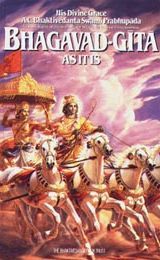

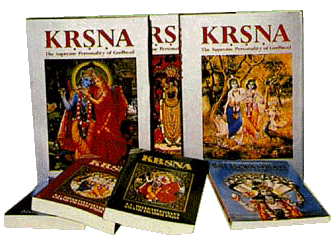
The Complete Works of Srila Prabhupada
All the books, the letters and conversations at your
fingertips
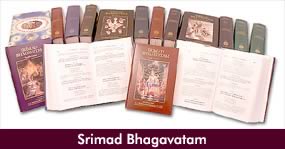
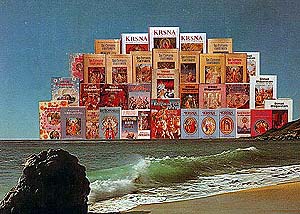
All Srila Prabhupada's books and more on one disk
http://www.vedabase.com




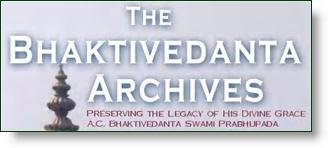
Srila Prabhupada's Audio lectures to listen to on-line:
http://www.hare-krishna.org/srila-prabhupada-lectures.htm
Listen to Srila A.C. Bhaktivedanta Swami Prabhupada on-line
- all 900 of his lectures are available HERE:
http://www.prabhupadavani.org/
Srimad Bhagavatam - the entire lecture series listen and
read along on-line - Narrated by Amala Bhakta dasa:
http://www.prabhupadavani.org/SB_index.html

The new enhanced Prabhupada MP3 series
http://www.prabhupada.com/store/store.php?page=product.php&id=MP3AUDIOLIB

The Audio Srila Prabhupada Lilamrita
Please find enclosed details a being launched on Gaura Purnima day 2008.
It is a simple audio rendition of sections from "Prabhupada,
your ever well-wisher" by Satsvarupa dasa Goswami.
It was recorded here in the UK back in the mid '90's
by Bhagavat-Asraya prabhu (ACBSP) at my studio and I edited it into 8 short
instalments for inclusion on my weekly radio programme "Nectar of Devotion".
We had such a good response from listeners that it was
decided to add "The Audio Srila Prabhupada Lilamrita" to the Nectar of
Devotion website archive page.
In doing so I felt it might be nice to create a very simple,
seperate website for the Lilamrita.
The result is http://www.lilamrita.page.tl
It will be officially launched on Gaura Purnima day 2008
for the pleasure of Srila Prabhupada and all the Vaishnava's.
I hope this humble attempt will add to the growing appreciation
of Srila Prabhupada's remarkable achievements.
If other Krishna conscious radio stations would like
to broadcast this Lilamrita series they can contact me at devotion@nusoundradio.com
and I can send them mp3 copies.

Srila Prabhupada Vyasa-puja book 2007
http://www.krishna.com/node/1048
Vyasa-puja is an annual celebration by the devotees of Lord Krishna
to offer homage to their guru, or spiritual teacher.
There are two versions of the Vyasa Puja Book based on the speed of
your internet connection.
If you are unable to open the file, download Acrobat Reader.
High speed connections, with pictures.
Vyasa-puja
Book 2007 [PDF/ZIP, 2.11MB]
Low speed connections, no pictures.
Vyasa-puja
Book 2007 (no pictures) [PDF/ZIP, 2.11MB]








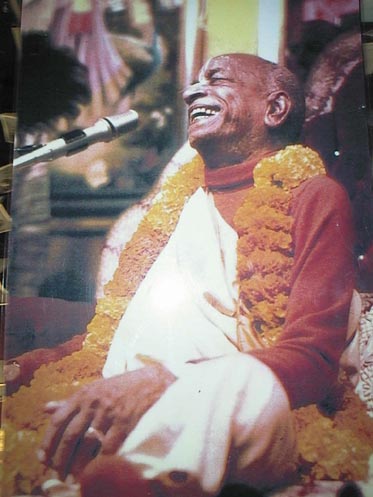
Visit "Prabhupada Connect" for all manner of Prabhupad
Nectar:
http://www.prabhupadaconnect.com/Index.html
Srila Prabhupada's Final Lesson Video - Downloadable and
viewing on-line
http://users.iskconludhiana.com/images/thumbnails.php?album=21


All Srila Prabhupada's original books
available for sale here.

Download all the Hare Krsna teachings which includes
all Vaisnava and
Vedic concepts by visiting one of the sites listed at
the following address.
http://www.geocities.com/suci123/bookdownloadsites1.html
The Bhaktivedanta Book Trust
Srila Prabhupad Memorial Library
http://www.krishna.com/main.php?id=33


33 Books Online Including Srimad Bhagavatam!
http://www.geocities.com/freeprabhupadabooks
The compressed "self extracting" file mentioned is now currently
available for download
http://www.krsnaconsciousness.org/Gauranga/Folio/BhaktivedantaVedabase_DOS.exe

Download or Listen to Prabhupad Bhajans HERE:
http://www.prabhupadavani.org/web/text/Bhajans.html


On-line 1972 McMillan edition - Bhagavad Gita As It Is:
http://www.asitis.com/

Bhagavad Gita AS IT IS on-line through the Tirupathi
Balaji site:
http://www.bhagavad-gita.us/

Bhagavad Gita Study guide on-line book:
http://chantandbehappy.com/gita/studyguide/StudyGuide-main.htm
Bhagavad Gita Study guides by numerous Iskcon devotees
- FREE downloads:
http://www.veda.harekrsna.cz/library/#3

All the Scriptures you'd ever need 4 FREE
http://www.hknet.org.nz/index-books.htm
http://www.hknet.org.nz/DDB.htm
http://www.hknet.org.nz/DDB2.html
last updated 4th August 2003


Srimad Bhagavad Gita AS
IT IS
Bhagavad Gita: Chapter
6 - Dhyana-yoga
TEXT 47
yoginam api sarvesam
mad-gatenantar-atmana
sraddhavan bhajate yo mam
sa me yuktatamo matah
WORD FOR WORD
yoginam--of yogis; api--also; sarvesam--all types of;
mat-gatena--abiding in Me, always thinking of Me; antah-atmana--within
himself; sraddha-van--in full faith; bhajate--renders transcendental loving
service; yah--one who; mam--to Me (the Supreme Lord); sah--he; me--by Me;
yukta-tamah--the greatest yogi; matah--is considered.
TRANSLATION
And of all yogis, the one with great faith who always
abides in Me, thinks of Me within himself, and renders transcendental loving
service to Me--he is the most intimately united with Me in yoga and is
the highest of all. That is My opinion.
PURPORT by HDG Srila A.C. Bhaktivedanta Swami Prabhupad:
The word bhajate is significant here. Bhajate has its root
in the verb bhaj, which is used when there is need of service. The English
word "worship" cannot be used in the same sense as bhaj. Worship means
to adore, or to show respect and honor to the worthy one. But service with
love and faith is especially meant for the Supreme Personality of Godhead.
One can avoid worshiping a respectable man or a demigod and may be called
discourteous, but one cannot avoid serving the Supreme Lord without being
thoroughly condemned. Every living entity is part and parcel of the Supreme
Personality of Godhead, and thus every living entity is intended to serve
the Supreme Lord by his own constitution. Failing to do this, he falls
down. The Bhagavatam (11.5.3) confirms this as follows:
ya esam purusam saksad
atma-prabhavam isvaram
na bhajanty avajananti
sthanad bhrastah patanty adhah
"Anyone who does not render service and neglects his duty
unto the primeval Lord, who is the source of all living entities, will
certainly fall down from his constitutional position."
In this verse also the word bhajanti is used. Therefore,
bhajanti is applicable to the Supreme Lord only, whereas the word "worship"
can be applied to demigods or to any other common living entity. The word
avajananti, used in this verse of Srimad-Bhagavatam, is also found in the
Bhagavad-gita. Avajananti mam mudhah: "Only the fools and rascals deride
the Supreme Personality of Godhead, Lord Krsna." Such fools take it upon
themselves to write commentaries on the Bhagavad-gita without an attitude
of service to the Lord. Consequently they cannot properly distinguish between
the word bhajanti and the word "worship."
The culmination of all kinds of yoga practices lies in
bhakti yoga. All other yogas are but means to come to the point of bhakti
in bhakti-yoga. Yoga actually means bhakti-yoga; all other yogas are progressions
toward the destination of bhakti-yoga. From the beginning of karma-yoga
to the end of bhakti-yoga is a long way to self-realization. Karma-yoga,
without fruitive results, is the beginning of this path. When karma-yoga
increases in knowledge and renunciation, the stage is called jnana-yoga.
When jnana-yoga increases in meditation on the Supersoul by different physical
processes, and the mind is on Him, it is called astanga-yoga. And when
one surpasses the astanga-yoga and comes to the point of the Supreme Personality
of Godhead Krsna, it is called bhakti yoga, the culmination. Factually,
bhakti-yoga is the ultimate goal, but to analyze bhakti-yoga minutely one
has to understand these other yogas. The yogi who is progressive is therefore
on the true path of eternal good fortune. One who sticks to a particular
point and does not make further progress is called by that particular name:
karma-yogi, jnana-yogi or dhyana-yogi, raja-yogi, hatha-yogi, etc. If one
is fortunate enough to come to the point of bhakti-yoga, it is to be understood
that he has surpassed all other yogas. Therefore, to become Krsna conscious
is the highest stage of yoga, just as, when we speak of Himalayan, we refer
to the world's highest mountains, of which the highest peak, Mount Everest,
is considered to be the culmination.
It is by great fortune that one comes to Krsna consciousness
on the path of bhakti-yoga to become well situated according to the Vedic
direction. The ideal yogi concentrates his attention on Krsna, who is called
Syamasundara, who is as beautifully colored as a cloud, whose lotuslike
face is as effulgent as the sun, whose dress is brilliant with jewels and
whose body is flower-garlanded. Illuminating all sides is His gorgeous
luster, which is called the brahmajyoti. He incarnates in different forms
such as Rama, Nrsimha, Varaha and Krsna, the Supreme Personality of Godhead,
and He descends like a human being, as the son of mother Yasoda, and He
is known as Krsna, Govinda and Vasudeva. He is the perfect child, husband,
friend and master, and He is full with all opulences and transcendental
qualities. If one remains fully conscious of these features of the Lord,
he is called the highest yogi.
This stage of highest perfection in yoga can be attained
only by bhakti-yoga, as is confirmed in all Vedic literature:
yasya deve para bhaktir
yatha deve tatha gurau
tasyaite kathita hy arthah
prakasante mahatmanah
"Only unto those great souls who have implicit faith in
both the Lord and the spiritual master are all the imports of Vedic knowledge
automatically revealed." (Svetasvatara Upanisad 6.23)
Bhaktir asya bhajanam tad ihamutropadhi-nairasyenamusmin
manah-kalpanam, etad eva naiskarmyam. "Bhakti means devotional service
to the Lord which is free from desire for material profit, either in this
life or in the next. Devoid of such inclinations, one should fully absorb
the mind in the Supreme. That is the purpose of naiskarmya." (Gopala-tapani
Upanisad 1.15)
These are some of the means for performance of bhakti, or Krsna consciousness,
the highest perfectional stage of the yoga system.
Thus end the Bhaktivedanta Purports to the Sixth Chapter of the Srimad
Bhagavad-gita in the matter of Dhyana-yoga.
His Divine Grace A.C. Bhaktivedanta Swami Prabhupada
Copyright 1983 The Bhaktivedanta Book Trust International. Used with
permission.

Bhagavad Gita As It Is - http://www.asitis.com/
Bhaktivedanta Vedabase - Bhagavad Gita on-line http://bhagavadgitaasitis.com/
Bhaktivedanta VedaBase: Bhagavad-gita As It Is http://vedabase.net/bg/en
Bhagavad Gita Multi Media Web-version http://chantandbehappy.com/gita/
Listen to Bhagavad Gita on line - http://www.Gitamrta.org
View our Bhagavad Gita Overview:
http://www.hknet.org.nz/BG.html
Archive: http://www.cs.rice.edu/~vivek/btg/archive/
Home Page: http://www.cs.rice.edu/~vivek/btg/
Join Bhagavad Gita eGroups HERE
mailto:bhagavad_gita-owner@egroups.com


Prabhupada Uvacha:
(here's some nectar, sometimes it comes in the form of Srutakirti prabhu's
diary, other times from Govinda dasi's diary, Hari Sauri prabhu's Transcendental
Diary, Bhurijan prabhu's book, or sometimes from a letter, or other related
source, but still nectar...)
Take birth again and again
Vipina told Prabhupada an example he had heard
which seemed to exemplify life in the material world and the suffering
it produces. "The male and female black widow spiders have sex life. After
the sex life the female spider consumes the male spider, eats him alive."
Srila Prabhupada laughed. "So we are also killing
by and by, and she kills immediately -- that is the difference. Tulasi
dasa has said that: din ka dakini rat ka baghini, palak palak rahu cuse,
duniya sab bara hoke ghare ghare baghini sei. That there is an animal who
is at daytime a witch and at nighttime she's tigress. So her only business
is to suck the blood. But people are so mad that everyone is keeping that
tigress; every home, there is a tigress like that."
"That's their wife," I said.
Srila Prabhupada continued laughing. "At daytime,
witch, and nighttime, tigress. This is her picture. But people know it,
and still, they keep one tigress at home. So that lady spider and lord
spider, that is everywhere. But here gradually, and they are immediately;
that is the difference, the process is the same."
He described the selfdefeat of sex indulgence.
"People want to enjoy by sex, by seminal discharge, but what is this? His
blood. By forty drops of blood one drop of semina is created. So one ounce
of semina discharged means forty ounces of blood sucked. This is a fact.
So he is enjoying his own blood, and he's thinking, 'I am enjoying.' Therefore
he's compared with the camel. Camel eats the thorny twigs, and the thorns
prick the tongue and blood comes out. So after twig is mixed with blood,
it becomes tasteful, and he thinks thorn is very nice. So thorn is not
nice; nice is his blood, own blood. But he, because he's animal, he's thinking
it is very nice."
In speaking about the entrapment of sex life Prabhupada
wasn't just referring to the living beings on this planet. He briefly mentioned
a story from the Eighth Canto of Srimad-Bhagavatam. "In the heavenly planets
the woman is described that during summer the body is very cool of the
woman, and during winter the body is very warm. That is the nature of the
woman in the heavenly planets. And their breast is very, very tight and
strongly built, and their youthfulness never diminishes. These are the
description of the heavenly woman. Bhagavata, everything is there. Mohini-murti
began to play with the ball, and the description of the breast is there
and armpit. So she was playing ball one hand and one hand a bunch of hair
would become [loose], immediately she was taking care. So with this beauty
Lord Siva become mad. As soon as one man sees the breast and this armpit
of young woman, then he is finished."
"So what happens to us?" Vipina asked.
"It is every man that this is the position, this
is the position. And so long we will be charmed with these things, he has
to take birth again and again."
- From the "A Transcendental Diary Vol 3" by HG
Hari Sauri dasa
To receive little snippets of nectar like this on a daily basis subscribe
HERE: or If you want to introduce anyone else in reading Srila Prabhupada
Nectars, please send their eMail addresses to mailto:krpamaya_gauranga@hotmail.com
Please Chant:
 Hare
Krishna Hare Krishna Krishna Krishna Hare Hare
Hare
Krishna Hare Krishna Krishna Krishna Hare Hare
 Hare
Rama Hare Rama Rama Rama Hare Hare
Hare
Rama Hare Rama Rama Rama Hare Hare
...................and be Happy

Listen to Srila Prabhupad on-line
....a different lecture, morning walk, conversation or
class daily.
"Seeing Krishna Face To Face"
Srimad-Bhagavatam 1.15.47-48
Los Angeles, December 25, 1973
Listen to the entire lecture on-line:
http://prabhupadaradio.com/M3U/Bhagavatam/m3u_II/SB254.m3u
Pradyumna: "Thus by pure consciousness due to constant devotional remembrance,
they attained the spiritual sky, which is ruled by the Supreme Narayana,
Lord Krsna. This is attained only by those who meditate upon the one Supreme
Lord without deviation. This abode of the Lord Sri Krsna, known as Goloka
Vrndavana, cannot be attained by persons who are absorbed in the material
conception of life. But the Pandavas, being completely washed of all material
contamination, attained that abode in their very same bodies."
Prabhupada: Tad-dhyana udriktaya. Dhyana means meditation. So the Pandavas,
always they were thinking of Krsna. While they were eating, they were sitting,
they were sleeping, they were talking, they were fighting -- Krsna. This
is Krsna consciousness. When Arjuna was fighting, so there was also Krsna.
When they were dealing in politics with Duryodhana, there was Krsna. Krsna
is his friend, always talking with him, staying with him, sleeping with
him, eating with him.
So anyone can do that. Krsna consciousness is so nice. If in our ordinary
life we deal with Krsna as Arjuna did and the Pandavas did, so where is
the difficulty for us? There is no difficulty. Simply we have to practice
it. And that practice is bhaktya. This is only possible through devotional
service. Krsna was so near to the Pandavas on account of their devotion.
Narada Muni eulogized the Pandavas that "Jnanis and yogis, they cannot
reach even, but by your devotion, He is living with you as friend. Not
only as friend, but sometimes as your order-carrier." Pandavas sometimes,
during their negotiation with Duryodhana, sometimes asked Krsna, "Krsna,
You take this letter and deliver to Duryodhana." Agreed, "Yes, I will go."
So ordinary peon. Then ordinary chariot driver, Partha-sarathi.
So this is possible. If you become devotee of Krsna, then you can live
with Krsna, even in this life. Even in this life. Because Krsna is omnipotent,
if you are really devotee of Krsna, He will talk with you, He will dance
with you, He will eat with you, everything. Premanjana-cchurita-bhakti-vilocanena
[Bs. 5.38]. Again this bhakti. By bhakti, prema, love. Premanjana-cchurita-bhakti-vilocanena
santah sadaiva [Bs. 5.38]. Santah, saintly persons. This word, Sanskrit
word, santah, is also I think Latin. "Saint," santah. Santah means saintly
persons. So santah, those who are saintly persons, those who have developed
love of Krsna, they can see Krsna every moment. Santah sadaiva. Sadaiva
means "every moment." They do not see anything except Krsna. That is saintly
person. Rascals inquire, "Have you seen God?" "Not seen God, sir. He is
seeing every moment." There is no question of seeing God once. No. Sadaiva.
Santah sadaiva.
How one can see sadaiva? Krsna is already there. Isvarah sarva-bhutanam
hrd-dese 'rjuna tisthati [Bg. 18.61]. The location is given here in the
Bhagavad-gita, that you can see God, not you have to go far away from your
place. Wherever you are, you can see, because God is within your heart.
Isvarah sarva-bhutanam hrd-dese [Bg. 18.61]. Sarva-bhutanam. Not only for
human being, but also animals, beasts, trees, plants, aquatics, insects
-- everyone, beginning from Brahma down to the ant. God is everywhere.
Andantara-stha-paramanu-cayantara-stham. God is within this universe, within
your heart, even within your atom. So where is the difficulty? Simply you
have to make your eyes to see Him. That's all. That is premanjana-cchurita-bhakti-vilocanena
[Bs. 5.38]. Love. It is not very difficult to understand. If you love somebody,
then you can see him always. When you are in office, you are seeing. When
you are eating, you are seeing. You are seeing... If you are actually love.
So if it is possible materially, how much greatly it is possible spiritually
and perfectly? It is possible. Simply by this method, bhaktya visuddha-dhisanah
pare.
Visuddha. Visuddha means purified. Our consciousness is not purified
at the present moment, but if we purify it... That purification also is
possible by becoming in touch with Krsna always. And this touch is very
easily made possible. Srnvatam. This is the chance, srnvatam. Srnvatam
means by hearing, by aural reception. Simply those who are coming here,
even they do not know anything about it, but God has given this ear, and
let him hear about Krsna. We are therefore discussing so many... We have
written so many books simply about Krsna. Not all books published -- we
have published about twenty books -- but we have to finish it. It cannot
be finished, but at least, to some extent it will be finished by sixty
books. And what is that subject matter? Krsna. That's all. People cannot
imagine that about God, sixty books can be written. There is no, I mean
to say, system of religion where you can find... Not only... Sixty is the
minimum. Sixty books of four hundred pages can be written simply on God.
So there is possible... If we divert our attention to Krsna consciousness,
we can chant Krsna -- Hare Krsna, Hare Krsna, Krsna Krsna, Hare Hare. Kirtanad
eva krsnasya. We can read about Krsna whole life, such big literature.
Whole life. If you read twenty-four hours daily -- that you cannot -- still,
you have to devote your whole life to finish this literature.
So we have got enough material to become Krsna conscious. My Guru Maharaja
was questioned by one big politician. He came to see him. So my Guru Maharaja...
He was asking, "What are your activities?" So at that time he was publishing
one paper. I think it is still published in Mayapura. It is called... What
is called, Dainik? Daily news, it was a daily newspaper, small. Navadvipa
Prakash, like that. Nadiya Prakash. Nadiya Prakash. So daily. So this politician
inquired from Guru Maharaja, "You are publishing a daily paper about God
consciousness?" "Yes." "No, what you are writing?" He was surprised. The
politicians think that newspaper can be filled up with rubbish political
news only. That's all. They cannot think that newspaper can be filled up
by news from spiritual world. Yes. They have no idea. They have no idea
there is spiritual world. So my Guru Maharaja explained that "Why you are
thinking of only one small newspaper? You do not know what is spiritual
world. This material world is one-fourth portion of the whole creation
of the Lord. And the three-fourths' portion is the spiritual world. And
in this one fourth portion there are innumerable universes. And in one
of the universes... This is one of the universe. And in each universe there
are millions of planets. And this planet, earthly planets, is only a small
planet in that universe. And on this earthly planet, there are so many
cities. And in each city, there are so many newspapers. And each newspaper
has got so many editions. This is the position of the material world. Now,
think over the spiritual world. It is... The spiritual world is three fourths,
three times bigger than this material... And there are so many planets,
so many universes, and so many activities. So we can produce not one newspaper
daily, but every minute a newspaper. We can produce. Unfortunately, there
is no customer. You see? This is the difficulty. For material news, there
are so many customers, but when we put something, spiritual news, no customer.
This is the difficulty. Otherwise... You are thinking of one newspaper
daily. We could issue every second a newspaper about spiritual news." So
this sixty books is not sufficient. It is simply an introduction to the
spiritual activities of the spiritual world. People have no interest. They
do not know. We are simply trying to introduce it.
So this can be understood by visuddha-dhisanah, purified meditation.
That requires practice, how to purify. Visuddha-dhisanah tasmin narayana-pade.
And it can be achieved by persons, ekanta-matayo gatim. A person who has
decided, "Now, in this life, I must go back to home, back to Godhead,"
for him, it is possible. This decision. So that is called... In Bhagavad-gita
it is described,
vyavasayatmika buddhir
ekeha kuru-nandana
bahu-sakha hy anantas ca
buddhayo 'vyavasayinam
One how has decided that "This life, it is not ordinary life like the
cats and dogs. It is human life. I have got advanced intelligence. And
it is possible in this life to back to home, back to Godhead, athato brahma
jijnasa, simply by cultivating spiritual knowledge. So why shall I waste
my time like cats and dogs?" This determination required. "The cats and
dogs are busy in eating, sleeping, sex life, and one day it dies. So why
shall I waste my time in that way? I have got good intelligence. Krsna
has provided me better standard of life. I can lie in nice room, not like
the cats and dogs on the street. Krsna has provided for me so nice foodstuff
which I can offer to Krsna, patram puspam phalam toyam, so nice fruits,
grains, milk. So let us utilize these things given by Krsna."
Krsna has given different foodstuff for different animals and human
beings. Krsna has given stool for the pigs and so nice foodstuff, fruits
and grains and milk, for the human being. Not that every food is for everyone.
No. What is called? "One man's food, another man's poison." So the stool
is also a kind of food. Everything is a kind of food. Even the stone is
also food. You know? The pigeons, they eat the stones particles. They can
digest. For them, the hardest peas are supplied. So they can digest. Payara-matara.
It is called in India, payara-matara. Payara means pigeon. Pigeon's peas.
They require such thing. Just like the gorilla. The gorilla animal, where
they live in the African jungles... We have read book. There are trees,
the fruits of that tree are so hard, harder than the iron bullet. You can
hammer on the bullet; it may bend. But that fruit will not bend. So those
fruits are taken by the gorillas, and they chew it just like you chew peanuts
or something like that, yes. (laughter)
So Krsna has given different foodstuff for different animals. So for
human being who is determined to go back to home, back to Godhead, they
have got their food. For them, no meat-eating. For them, fine kacuri, rasagulla,
puri, for them. As you are... I think Dr. Benard Shaw, he wrote one book,
You Are What You Eat. If you eat stool, then you are stool. Because after
all, this body will be stool. Because after death, the result is either
the body becomes stool or ash or earth. Those who are burying on the ground,
in due course the body will turn into earth. That's all. And those who
are burning, like in India, Hindus do, this will turn into ash. And those
who are throwing for being eaten by the animals and birds... Just like
Parsees do in India... They throw, and vultures come, and they eat it,
within a second. So after eating, it will be stool of the vulture. That's
all. So this beautiful body will be resulted in three things: either stool,
earth or ash. And we are taking so much care -- for stool, earth, and ashes.
And the occupier of the body? Forgotten. And we are advanced scientists.
This is our position.
Therefore it is said, visuddha-dhisanah pare. Those who are purified
in their thinking process... Those who are thinking, "I am this body,"
they are third-class rascals. The present world is simply full with third-class
rascals. Because everyone is thinking, "I am American," "I am American,"
"I am Indian," "I am white," "I am black," "I am Hindu," "I am Muslim,"
"I am Christian." So "I am this body." That's all. But they cannot. They
cannot. Therefore it is said, virajena atmanaiva. Virajena. Virajena means
one who has become completely washed, cleansed, viraja. Raja. Raja means
this material world, and vi means vigata, without. Virajenaiva. And it
is very difficult to come to this position. Therefore it is said, avapur
duravapam. It is very difficult to come to this stage of life, but the
Pandavas, avapuh, they got it. And for whom it is very difficult? That
is also: asadbhih. Asadbhir visayatmabhih.
Who is asat? Asat means that does not exist, or that will not exist.
There are two things: one thing will exist permanently, and one thing will
not exist. It may exist for few minutes, or few hours or years. So this
material world is asat, because it will not exist. Just like your this
material body, it will not exist. Everyone knows. Everyone knows that it
is born at a certain date, it will continue for certain years, it will
produce some by-products, it will change into different forms, and then
it will become old and then dwindle and one day finish. This is called
sad-vikara, six kinds of changes. It is not progress. If one is progressing
in his age, it is not progress. It means he is going to death. Suppose
I am seventy-eight years old. So I have... Seventy-eight years I have already
died. Only, say two or five years, or something like remaining balance.
So people say "advanced age." No. Advanced in death, not advanced in age.
So this is asat. It will not stay. It has begun to die from the very moment
of his birth. If you ask a newly born child how old it is, the mother says,
"It is one month old." So one month means he has already died one month.
And balance months and years he has to die. Simply he has to wait for that
death. So this kind of duration of life is called asat. And this kind of
existence, the material existence, it also asat. Narottama dasa Thakura
therefore sings, sat-sanga chadi' kainu asate vilasa, te-karane lagila
ye karma-bandha-phansa. "I gave up sat-sanga, om tat sat, spiritual society.
I associated myself with the material society. Therefore I am now entangled
by karma by karma, one after another, one after another."
So spiritual realization is difficult for persons, asadbhih. Why it
is difficult? Visayatmabhih. Because they are simply attracted by the four
principles of material life: eating, sleeping, sex life and, one day, death.
They cannot. One must be above this interest. One must be very sane man,
that "These kinds of interests are there in the animals. So if I am also
interested in only these things, then where is the difference between this
dog and me?" Something more.
That information is given in the Bhagavad-gita. Avinasi tu tad viddhi
yena sarvam idam tatam. Yena sarvam idam. This body is perishable, asat.
But there is another sat, means permanent thing. What is that? Avinasi
tu tad viddhi. You try to understand that thing, which is eternal. What
is that? Yena sarvam idam tatam, that which is spreading all over your
body. You pinch your body. You feel pain. Why? Because there is consciousness.
The consciousness is permanent. And as soon as the consciousness is gone,
you chopped up your hand, no response. So take... It is a very nice statement.
Tat, that consciousness, is avinasi, is eternal. Where is the difficulty?
So those who are not interested to understand this consciousness and
the origin of consciousness, they are asat. They cannot understand what
is spiritual life. Therefore the beginning of spiritual life... In the
Bhagavad-gita, it is said that dehino 'smin yatha dehe [Bg. 2.13]. In this
body, in this asat, this temporary body, there is the proprietor of the
body. Dehino 'smin yatha dehe. The proprietor of the body. So that is to
be understood. So how it can be understood? Vidhuta-kalmasah. Those who
are washed off of the sinful act... Therefore we prescribe that "Don't
be associated with sinful activities." What is that? Illicit sex, meat-eating,
intoxication and gambling. One who is washed off of these, vidhuta-kalmasa
sthanam, that sthanam, that place, is virajena atmanaiva vidhuta-kalmasah...
Those who are washed of... Otherwise it is not possible. If you think that
"I shall do this and do that," then do this, not that. That is finished.
You go on doing this life after life, and remain in this material world.
That is the point.
Thank you very much. (end)
>>> Ref. VedaBase => Srimad-Bhagavatam 1.15.47-48 -- Los Angeles, December
25, 1973
Listen to the entire lecture on-line:
http://prabhupadaradio.com/M3U/Bhagavatam/m3u_II/SB254.m3u
or receive in mailbox and Subscribe HERE:
mailto:lectures-subscribe@prabhupadavani.org
Sravanam kirtanam at:
http://www.PrabhupadaVani.org
© 2001 The Bhaktivedanta Book Trust International. Used with permission.

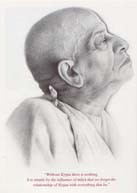
SRILA PRABHUPADA'S QUOTE OF THE DAY
He [Bhaktivinoda Thakura] sent his first book
in 1896. Bhaktivinoda Thakura was the origin of this movement. But he simply
thought of it. And he was expecting some others willing to take up the
work. Well, somebody says that I am the same man. And I was born in 1896.
Srimad-Bhagavatam Class, Tehran1975
Sign-up to receive these quote HERE:
mailto:haribol@pacific.net.sg

Bhaktivedanta Vedabase Network ...
http://vedabase.net/


The Scientific - Mathematical
Proof for God's existence:
http://geocities.com/sector114

http://robot-hosting.com/php/login_nicholas.html
user name = guest
password = guest
(Collection of philosophical and mathematical proofs
for existence of God can be found in this site.)

Scientifically Philosophical Books for the layman
 ...
... ...
...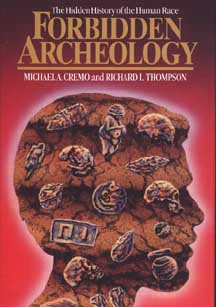 ...
...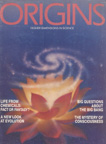
Click on any of these books to read more about them and where to get
a copy
or contact your local temple for purchases
sample of Life
comes from Life HERE.pdf

Lotus Imprints - Preserving Prabhupada's Legacy - The
Publishing House of Hari Sauri dasa
http://www.lotusimprints.com/

Quotes from Shastra - scriptures
View using Balaram font
 AparA
EkAdasii
AparA
EkAdasii
AparA EkAdasii: from the BrahmANDa
PurANa
Sri Yudhishthira MahArAj said, “Oh JanArdana, what is
the name of the EkAdasii that occurs during the dark fortnight (krishna
paksha) of the month of Jyeshtha (May-June) ? I wish to hear from
You the glories of this sacred day of Hari. Please narrate everything to
me”
Lord Sri Krishna said, “Oh king, your inquiry is wonderful
because the answer will benefit the whole human society. This EkAdasii
is so sublime and meritorious that even the greatest sins can be erased
by its purity.
“Oh great saintly king, the name of this unlimitedly meritorious
EkAdasii is AparA EkAdasii. Whoever fasts on this holy day becomes famous
all over the universe. Even such sins as killing a brAhmana, a cow, or
an embryo; blasphemy; or having sex with another man’s wife are completely
eradicated by observing AparA EkAdasii.
“Oh king people who bear false witness are most sinful.
A person who falsely or sarcastically glorifies another; one who cheats
while weighing something on a scale; one who fails to execute the duties
of his varna or Ashrama (an unqualified man’s posing as a brahmin, for
example, or a person’s reciting the Vedas wrongly); one who invents his
own scriptures; one who cheats others; one who is a charlatan astrologer,
a cheating accountant, or a false Ayurvedik doctor – all these are surely
as bad as persons who bears false witness, and they are all destined for
hellish punishments. But simply by observing AparA EkAdasii, all such sinners
become completely free of their sinful reactions.
“Warriors who fall from their kshatriya-dharma and flee
the battlefield go to a ferocious hell. But, Oh Yudhishthira, even such
a fallen kshatriya, if he observes fasting on the AparA EkAdasii, is freed
of that great sinful reaction and goes to heaven.
“That disciple is the greatest sinner who, after receiving
a proper spiritual education from his spiritual master, turns around and
blasphemes him. Such a so-called disciple suffers unlimitedly. But even
he, rascal though he be, if he simply observes AparA EkAdasii, can attain
to the spiritual world. Listen, Oh king, as I describe to you further glories
of this amazing EkAdasii.
“The merit attained by one who performs all of the following
acts of piety is equal to the merit achieved by one who observes AparA
EkAdasii: bathing three times daily in Pushkara-kshetra
during Kartika (October-November); bathing at Prayag
in the month of Magh (January-February) when the sun is in the zodiac of
Capricorn; rendering service to Lord Shiva at VarANasi (Benares) during
Shiva-ratri;
offering oblations to one’s forefathers at GayA; bathing in the sacred
Gautami River when Jupiter transits Leo (Simha); having darshan of Lord
Shiva at KedArnAtha; seeing Lord BadrinAth when the Sun transits the sign
of Aquarius (Kumbha); and bathing at the time of a solar
eclipse at Kurukshetra and giving cows, elephants, and gold there in
charity. All the merit one gets from performing these pious acts is gained
by a person who observes the AparA EkAdasii fast. Also, the merit attained
by one who donates a pregnant cow, along with gold and fertile land, is
attained by one who fasts on this day.
“In other words, AparA EkAdasii is an axe that cuts down
the fully matured forest full of trees of sinful deeds, it is a forest
fire that burns sins as if they were kindling firewood, it is the sun blazing
before one’s dark misdeeds, and it is a lion stalking the meek deer of
impiety.
“Therefore, Oh Yudhishthira, whoever truly fears his past
and present sins must observe AparA EkAdasii very strictly. One who does
not observe this fast must be born again in the material
world, like one bubble among millions in a huge body of water, or like
a small ant among all other species. NOTE
“Therefore one must faithfully observe the sacred AparA
EkAdasii and worship the Supreme Personality of Godhead, Sri
Trivikrama. One who does so is freed of all his sins and promoted to
the abode of Lord Vishnu.
“Oh BhArata, for the benefit of all humanity I have thus
described to you this the importance of the holy AparA EkAdasii.
“Anyone who hears or reads this description is certainly
freed from all kinds of sins, oh best of saintly kings, Yudhishthira.
Thus ends the narration of the glories of Jyeshtha-krishna EkAdasii,
or AparA EkAdasii, from the BrahmANDa PurANa.
These stories have been summarised and slightly changed or abbreviated
from how they are found in the celebrated book, "Ekadasi: The Day of Lord
Hari" 1986. HH Krishna Balaram Swami. Bhaktivedanta Institute Press. page
83-85.
NOTEs:
1/. Pushkara-kshetra, in western India, is the
only place on Earth where a bona-fide temple of Lord BrahmA is to be found.
2/. The Vedas declare, narAh budbudA samAh: “The human
form of life is like a bubble in water”. In water, many bubbles form and
then suddenly burst a few seconds later. Thus if a person does not utilize
his rare human body to serve the Supreme Personality of Godhead, Sri Krishna,
his life has no more value or permanence than a bubble in water. Therefore,
as the Lord herein recommends, we should serve Him by fasting on Hari-vAsara,
or EkAdasii.
In this regard, Srila A.C. Bhaktivedanta Swami Prabhupada writes
in the Srimad Bhagavatam (SB 2:1:4 purport) “The great ocean of material
nature is tossing with the waves of time, and the so-called living conditioned
are something like foaming bubbles, which appear before us as bodily self,
wife, children, society, countrymen, etc. Due to a lack of knowledge of
self, we become victimised by the force of ignorance and thus spoil the
valuable energy of human life in a vain search after permanent living conditions,
which are impossible in this material world.”
3/. Persons who are sick should consult with health
specialists before they take to fasting. After consulting in a practical
way, fast according to your situation. More on EkAdasii
fasting here.
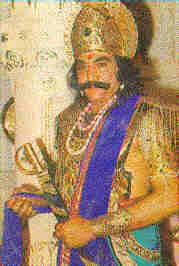
 PANDava
NirjalA EkAdasii
PANDava
NirjalA EkAdasii
PANDava NirjalA EkAdasii
The Pandava Nirjal
Ekadasi Menu:
Srila Prabhupada's suggestion
for Bhima ekadasi (Pandava nirjal ekadasi)
Everyone can fast according to degree
of health
NirjalA EkAdasii:
During the hottest season (northern hemisphere), if one
can perform upavasa without water one is performing a great feat. One may
take only charanamrta and achamana water. Bhima the mighty warrior of the
Pandava dynasty requested one vrata day by which he could obtain the fruits
of all the other days of vrata that he was incapable of observing. Vyasadeva
advised him to follow this difficult vrata.
One should worship the Lord in the
evening by bathing him in milk.
On the dvadasi one should give full pots of water to brahmanas
and feed them before breaking one's fast.
SAMVATSARASYA YA MADHYE EKADASYO BHAVANTI HI
TASAM PHALAM AVAPNOTI PUTRA ME NA ATRA SAMSAYAH
ITI MAM KESAVAH PRAHA SANKHA CAKRA GADADHARAH
(HARI BHAKTI VILASA 15/25 from PADMA PURANA Vyasadeva
speaks to Bhimasena)
Oh son, Lord Keshava, Who holds the club, disk,
conch and lotus flower in His hand, personally told me that all of the
merit achieved by fasting on whatever EkAdasis fall in one year can be
attained by fasting on this one EkAdasii (nirjalA EkAdasii). Of this, there
is no doubt.
ATMADROHAH KRTASTES TU YAIR ESA NA HY UPOSITA
PAPATMANO DURACARA DUSTAS TE NA ATRA SAMSAYAH
(HARI BHAKTI VILASA 15/33 from PADMA PURANA Vyasadeva
speaks to Bhimasena)
Anyone who does not fast on this particular EkAdasii
(nirjalA EkAdasii), they should be understood to be sinful, corrupted and
suicidal person without a doubt.
The Story of PANDava NirjalA
EkAdasii:
PANDava NirjalA EkAdasii - Jyeshtha-shukla EkAdasii -
from
Brahma-vaivarta PurANam.
Once Bhimasena, the younger brother of Maharaja Yudhisthira,
asked the great sage Shrila VyAsadeva, the grandfather of the PANDavas,
if it is possible to return to the spiritual world without having observed
all the rules and regulations of the EkAdasii fasts.
Bhimasena then spoke as follows, “Oh greatly intelligent
and learned grandfather, my brother Yudhisthira, my dear mother Kunti,
and my beloved wife Draupadi, as well as Arjuna, Nakula and Sahadeva, fast
completely on each EkAdasii and strictly follow all the rules, guidelines
and regulative injunctions of that sacred day. Bring very religious, they
always tell me that I should also fast on that day too. But, Oh learned
grandfather, I tell them that I cannot live without eating, because as
the son of VAyudeva – Samanaprana, (the digestive air) hunger is unbearable
to me. I can give widely in charity and worship Lord Keshava properly with
all manner of wonderful upacharas (items), but I cannot be asked to fast
on EkAdasii. Please tell me how I can obtain the same merits result without
fasting.”
Hearing these words, the grandsire of Bhima, Srila VyAsadeva
said, “If you want to go to the heavenly planets and avoid the hellish
planets, you should indeed observe a fast on both the light and dark EkAdasiis.”
Bhima replied, “Oh great saintly intelligent grandfather,
please listen to my plea. Oh greatest of munis, since I cannot live if
I eat only once in a day, how can I possibly live if I fast completely?
Within my stomach burns a special fire named Vrika, the fire of digestion.
Agni the fire-god, descends from Lord Vishnu through BrahmA, from BrahmA
to Angirasa, from Angirasa to Brihaspathi, and from Brihaspathi to Samyu,
who was Agni'’ father. He is the gatekeeper in charge of Nairritti, the
south-eastern direction. He is one of the eight material elements, and
Parikshit MahArAja, he is very expert at examining things. He examined
MahArAja Shibi once by turning into a dove (for further information on
this incident see Srila A.C. Bhaktivedanta Swami Prabhupada’s Srimad Bhagavatam
commentary to 1:12:20. Purport.)
Agni is divided into three categories; DavAgni, the fire
in wood, JatharAgni, the fire in the digestion in the stomach, and VadavAgni,
the fire that creates fog when hot and cold streams mix in for example
the ocean. Another name for the fire of digestion is Vrika. It is this
powerful fire that resided in Bhima’s stomach.
Only when I eat to my full satisfaction does the
fire in my stomach become satisfied. Oh great sage, I might possibly be
able to fast only once, so I beg that you tell me of an EkAdasii that is
worthy of my fasting and that includes all other EkAdasiis. I shall faithfully
observe that fast and hopefully still become eligible for liberation’s
release.”
Shrila VyAsadeva replied, Oh king, you have heard from
me about the various kinds of occupational duties, such as elaborate Vedik
ceremonies and pujas. In the Kali-yuga, however, no one will be able to
observe all these occupational, functional duties properly. I shall therefore
tell you how, at practically no expense, one can endure some small austerity
and achieve the greatest benefit and resultant happiness. The essence of
what is written in the Vedic literatures known as the PurANas is that one
should not eat on either the dark or light fortnight EkAdasiis.” As stated
in Srimad Bhagavatam (Mahabhagavat PurANam) 12:13:12 and 15.) the Bhagavat
PurANam is itself the essence or cream of all VedAnta philosophy (sara-vedAnta-sAram),
and the Srimad Bhagavatam’s unequivocal message is that of full surrender
to Lord Sri Krishna and the rendering of loving devotional service to Him.
Observing EkAdasii strictly is a great aid in that process, and here Shrila
VyAsadeva is simply stressing to Bhima the importance of the EkAdasii vratam.
“…One who fasts on EkAdasiis saved from going to the hellish planets.”
Hearing Shrila VyAsadeva’s words, the son of VAyu, Bhimasena,
the strongest of all warriors, became frightened and began to shake like
a leaf on a banyan tree in a strong wind. The frightened Bhimasena then
said, “Oh grandfather, what should I do? I am completely unable and ill
equipped to fast twice in a month throughout the year! Please tell me of
the one fasting day that will bestow the greatest benefit upon me!”
VyAsadeva replied, “Without drinking even water, you should
fast on the EkAdasii that occurs during the light fortnight of the month
of Jyeshtha (May-June) when the sun travels in the sign of Taurus (Vrishabh)
and Gemini (Mithun), According to learned personalities, on this day one
may bathe and perform Achamana for pratiprokshana purification. But while
performing Achamana one may drink only that amount of water equal to a
drop of gold, or that amount it takes to immerse a single mustard seed.
Only this amount of water should be placed in the right palm for sipping,
which one should form to resemble a cow’s ear. If one drinks more water
than this, he might as well have drunk wine – despite the soaring heat
of summer (in the northern hemisphere and cold in the southern hemisphere).
“One must certainly not eat anything, for if he does so
he breaks his fast. This rigid fast is in effect from sunrise on the EkAdasii
day to sunrise on the DwAdashii day. If a person endeavours to observe
this great fast very strictly, he easily achieves the result of observing
all twenty-four other EkAdasii fasts throughout the entire year.
“On DwAdashii the devotee should bathe early in the morning.
Then, according to the prescribed rules, guidelines and regulative injunctions,
and of course depending on his ability, he should give some gold and water
to worthy brAhmaNas. Finally, he should cheerfully honour prasAdam with
a brAhmaNa.
“Oh Bhimasena, one who can fast on this special EkAdasii
in this manner reaps the benefit of having fasted on every EkAdasii during
the year. There is no doubt of this, nor should there be. Oh Bhima, now
hear the specific merit one gets by fasting on this EkAdasii. The Supreme
Lord Keshava, who holds a conch, discus, club and lotus, personally told
me, ‘Everyone should take shelter of Me and follow My instructions.’ Then
He told me that one who fasts on this EkAdasii, without taking even drinking
water or eating, becomes free of all sinful reactions, and that one who
observes the difficult nirjalA fast on Jyeshtha-shukla EkAdasii truly reaps
the benefit of all other EkAdasii fasts.
“Oh Bhimasena, in the Kali-yuga, the age of quarrel and
hypocrisy, when all the principles of the Vedas will have been destroyed
or greatly minimised, and when there will be no proper charity or observance
of the ancient Vedik principles and ceremonies, how will there be any means
of purifying the self? But there is the opportunity to fast on EkAdasii
and become free of all one’s past sins.
“Oh son of VAyu, what more can I say to you? You should
not eat during the EkAdasiis that occur during the dark and light fortnights,
and you should even give up drinking water (nir = no jalaa= water) on the
particularly auspicious EkAdasii day of Jyeshtha-shukla EkAdasii. Oh Vrikodara
(veracious eater), whoever fasts on this EkAdasii receives the merits of
bathing in all the places of pilgrimage, giving all kinds of charities
to worthy persons, and fasting on all the dark and light EkAdasiis throughout
the year, in one go. Of this there is no doubt.
Oh tiger among men, whoever fasts on this EkAdasii
truly becomes a great person and achieves all manner of opulence and wealth,
grains, strength, and health. And at the fearful moment of death, the terrible
YamadUtas, whose complexions are yellow and black and who brandish huge
maces and twirl mystic pAsha ropes in the air for binding their victims,
will refuse to approach him. Rather, such a faithful soul will at once
be taken to the supreme abode of Lord Vishnu by the Vishnu-dUtas, whose
transcendentally beautiful forms are clothed in gorgeous yellowish garments
and who each hold a disk, club, conch and lotus in their four hands, resembling
Lord Vishnu. It is to gain all these benefits that one should certainly
fast on this very auspicious and important EkAdasii, even from water.”
When the other PANDavas heard about the benefits to be
gained by following Jyeshtha-shukla EkAdasii, they resolved to observe
it exactly as their grandfather Srila VyAsadeva had explained it to their
brother, Bhimasena. All the PANDavas observed it by refraining from eating
or drinking anything, and thus this day is also known as PANDava NirjalA
DvAdashii (technically it is a Maha-DvAdashii).
Shrila VyAsadeva continued, Oh Bhimasen, therefore you
should observe this important fast to remove all your past sinful reactions.
You should pray to the Supreme Personality of Godhead, Lord Sri Krishna
in this way making your sankalpa declaration, ‘Oh Lord of all the devas
(demigods), Oh Supreme Personality of Godhead, today I shall observe EkAdasii
without taking any water. Oh unlimited Anantadev, I shall break fast on
the next day, DwAdashii.’ Thereafter, to remove all his sins, the
devotee should honour this EkAdasii fast with full faith in the Lord and
with full control over his senses. Whether his sins are equal in volume
to Mount Sumeru or to MandarAchala Hill, if he or she observes this EkAdasii,
the sins that have been accumulated all become nullified and are burned
to ashes. Such is the great power of this EkAdasii.
“Oh best of human beings, although a person should also
give water and cows in charity during this EkAdasii, if for some reason
or other he cannot, then he should give a qualified brAhmaNa some cloth
or a pot filled with water. Indeed, the merit achieved by giving water
alone equals that gained by giving gold ten million times a day.
“Oh Bhima, Lord Sri Krishna has said that whoever observes
this EkAdasii should take a Holy bath, give charity to a worthy person,
chant the Lord’s Holy names on a japa-mAla,
and perform some kind of recommended sacrifice, for by doing these things
on this day one receives imperishable benefits. There is no need to perform
any other kind of religious duty. Observance of this EkAdasii fast alone
promotes one to the supreme abode of Sri Vishnu. Oh best of the Kurus,
if one donates gold, cloth, or anything else on this day, the merit one
obtains is imperishable.
“Remember, whosoever eats any grains on EkAdasii becomes
contaminated by sin and verily eats only sin. In effect, he has already
become a dog-eater, and after death he suffers a hellish existence. But
he who observes this sacred Jyeshtha-shukla EkAdasii and gives something
in charity certainly achieves liberation from the cycle of repeated birth
and death and attains to the supreme abode. Observing this EkAdasii, which
is merged with DwAdashii, frees one from the horrible sin of killing a
brAhmaNa, drinking liquor and wine, becoming envious of one’s spiritual
master and ignoring his instructions, and continually telling lies.
“Furthermore, Oh best of beings (Jivottama), any man or
woman who observes this fast properly and worships the Supreme Lord JalshAyi
(He who sleeps on the water), and who on the next day satisfies a qualified
brAhmaNa with nice sweets and a donation of cows and money – such a person
certainly pleases the Supreme Lord Vasudeva, so much so that one hundred
previous generations in his family undoubtedly go to the Supreme Lord’s
abode, even though they may have been very sinful, of bad character, and
guilty of suicide, etc. Indeed, one who observes this amazing EkAdasii
rides on a glorious celestial airplane (vimAna) to the Lord’s abode.
“One who on this day gives a brAhmaNa a waterpot, an umbrella,
or shoes surely goes to the heavenly planets. Indeed, he who simply hears
these glories also attains to the transcendental abode of the Supreme Lord,
Shri Vishnu. Whoever performs the Shraddha ceremony to the forefathers
on the dark-moon day called amAvasya, particularly if it occurs at the
time of a solar eclipse undoubtedly achieves great merit, but this same
merit is achieved by him who simply hears this sacred narration – so
powerful and so dear to the Lord is this EkAdasii.
“One should clean his teeth properly and, without eating
or drinking, observe this EkAdasii to please the Supreme Lord, Keshava.
On the day after EkAdasii one should worship the Supreme Personality of
Godhead in His form as Trivikrama by offering Him water, flowers, incense,
and a brightly burning lamp. Then the devotee should pray from the heart,
‘Oh God of gods, Oh deliverer of everyone, Oh Hrishikesha, master of the
senses, kindly bestow upon me the gift of liberation, though I can offer
you nothing greater than this humble pot filled with water.’ Then
the devotee should donate the waterpot to a brAhmaNa.
“Oh Bhimasena, after this EkAdasii fast and donating the
recommended items according to his ability, the devotee should feed brAhmaNas
and thereafter honour prasAdam silently.”
Shrila VyAsadeva concluded, “I strongly urge you to fast
on this auspicious, purifying, sin-devouring DwAdashii in just the way
I have outlined. Thus you will be completely freed of all sins and reach
the supreme abode.”
Thus ends the narration of the glories of Jyeshtha-shukla EkAdasii,
or Bhimaseni-nirjalA EkAdasii,
from the Brahma-vaivarta PurANa.
These stories have been summarised and slightly changed or abbreviated
from how they are found in the celebrated book, "Ekadasi: The Day of Lord
Hari" 1986. HH Krishna Balaram Swami. Bhaktivedanta Institute Press. pages
87-91.
Pandava Nirjala ekadasi recipes.........
The Ekadasi Page:
Srila
Bhaktisiddhanta Saraswati's Navadwip Panjika Intro'
Vaishnava
Calendar Page
Ekadasi Vratas according
to Hari Bhakti Vilas smriti
Ekadasis Throughout the
year in detail - their observances, benefits, and individual origin
Choose The Month (Vaishnava or Western), Paksha
or Ekadasi

The following needs to be viewed using the Balaram
font - if you do not have it, then download it for FREE from HERE
Srimad Bhagavatam purport 1:12:20.
TRANSLATION
This child will be a munificent
donor of charity and protector of the surrendered, like the famous King
Çibi of the Uçénara country. And he will expand the
name and fame of his family like Bharata, the son of Mahäräja
Duñyanta.
PURPORT
A king becomes famous by his acts
of charity, performances of yajïas, protection of the surrendered,
etc. A kñatriya king is proud to give protection to the surrendered
souls. This attitude of a king is called éçvara-bhava, or
factual power to give protection in a righteous cause. In the Bhagavad-gétä
the Lord instructs living beings to surrender unto Him, and He promises
all protection. The Lord is all-powerful and true to His word, and therefore
He never fails to give protection to His different devotees. The king,
being the representative of the Lord, must possess this attitude of giving
protection to the surrendered souls at all risk. Mahäräja Çibi,
the King of Uçénara, was an intimate friend of Mahäräja
Yayäti, who was able to reach the heavenly planets along with Mahäräja
Çibi. Mahäräja Çibi was aware of the heavenly planet
where he was to be transferred after his death, and the description of
this heavenly planet is given in the Mahäbhärata (Ädi-parva
96.6–9). Mahäräja Çibi was so charitably disposed that
he wanted to give over his acquired position in the heavenly kingdom to
Yayäti, but he did not accept it. Yayäti went to the heavenly
planet along with great åñis like Añöaka and others.
On inquiry from the åñis, Yayäti gave an account of Çibi’s
pious acts when all of them were on the path to heaven. He has become a
member of the assembly of Yamaräja, who has become his worshipful
deity. As confirmed in the Bhagavad-gétä, the worshiper of
the demigods goes to the planets of the demigods (yänti deva-vratä
devän [Bg. 9.25]); so Mahäräja Çibi has become an
associate of the great Vaiñëava authority Yamaräja on
that particular planet. While he was on the earth he became very famous
as a protector of surrendered souls and a donor of charities. The King
of heaven once took the shape of a pigeon-hunter bird (eagle), and Agni,
the fire-god, took the shape of a pigeon. The pigeon, while being chased
by the eagle, took shelter on the lap of Mahäräja Çibi,
and the hunter eagle wanted the pigeon back from the King. The King wanted
to give it some other meat to eat and requested the bird not to kill the
pigeon. The hunter bird refused to accept the King’s offer, but it was
settled later on that the eagle would accept flesh from the body of the
King of the pigeon’s equivalent weight. The King began to cut flesh from
his body to weigh in the balance equivalent to the weight of the pigeon,
but the mystic pigeon always remained heavier. The King then put himself
on the balance to equate with the pigeon, and the demigods were pleased
with him. The King of heaven and the fire-god disclosed their identity,
and the King was blessed by them. Devarñi Närada also glorified
Mahäräja Çibi for his great achievements, specifically
in charity and protection. Mahäräja Çibi sacrificed his
own son for the satisfaction of human beings in his kingdom. And thus child
Parékñit was to become a second Çibi in charity and
protection.
Dauñyanti Bharata: There
are many Bharatas in history, of which Bharata the brother of Lord Räma,
Bharata the son of King Åñabha, and Bharata the son of Mahäräja
Duñyanta are very famous. And all these Bharatas are historically
known to the universe. This earth planet is known as Bhärata, or Bhärata-varña,
due to King Bharata the son of Åñabha, but according to some
this land is known as Bhärata due to the reign of the son of Duñyanta.
So far as we are convinced, this land’s name Bhärata-varña
was established from the reign of Bharata the son of King Åñabha.
Before him the land was known as Ilävati-varña, but just after
the coronation of Bharata, the son of Åñabha, this land became
famous as Bhärata-varña.
But despite all this, Bharata, the
son of Mahäräja Duñyanta was not less important. He is
the son of the famous beauty Çakuntalä. Mahäräja
Duñyanta fell in love with Çakuntalä in the forest,
and Bharata was conceived. After that, Mahäräja forgot his wife
Çakuntalä by the curse of Kaëva Muni, and the child Bharata
was brought up in the forest by his mother. Even in his childhood he was
so powerful that he challenged the lions and elephants in the forest and
would fight with them as little children play with cats and dogs. Because
of the boy’s becoming so strong, more than the so-called modern Tarzan,
the åñis in the forest called him Sarvadaman, or one who is
able to control everyone. A full description of Mahäräja Bharata
is given in the Mahäbhärata, Ädi-parva. The Päëòavas,
or the Kurus, are sometimes addressed as Bhärata due to being born
in the dynasty of the famous Mahäräja Bharata, the son of King
Duñyanta.

Rämeçvara:
On the calendar it says it is Bhéma-ekädaçé.
Prabhupäda: Bhéma-ekädaçé,
yes.
Rämeçvara: So I’ve been
told that if one fasts on Bhéma-ekädaçé, that
it is like fasting on all the ekädaçés. Is that true?
Prabhupäda: Yes. Ekädaçé
is meant for fasting, either Bhéma or Arjuna. But we cannot fast,
therefore we have to take little fruits and.... Otherwise, ekädaçé
means fasting.
Tamäla Kåñëa:
If it is possible, should we go without eating at all?
Prabhupäda: Yes. But don’t
lie down and sleep.
Mahendra: Eating mahä-prasädam
is also fasting.
Prabhupäda: Who says?
Mahendra: You said that to Paramahaàsa
Swami once.
Prabhupäda: And you heard from
Paramahaàsa.
Mahendra: No, I was in the room.
It was when he was trying to observe Caturmäsya.
Prabhupäda: I never said that.
Mahendra: Oh, okay, I must have
heard wrong.
Prabhupäda: If there is service
and, on my fasting, service will be stopped, then I can take. First consideration,
service. Now if somebody feels weak, he can take mahä-prasäda,
render service.
Rämeçvara: That priest
that has now become your disciple, he’s joining Satsvarüpa Mahäräja’s
party. He’s very interested, and Satsvarüpa Mahäräja has
said he would like him to come to travel together and study.
Prabhupäda: Very good.
( ACBSP. Morning Walk. June 7th 1976.
Los Angeles)

Fasting:
"One who is physically unable to fast on Ekadasi may
read the glories of each Ekadasi when it occurs and recite all the
names
of the Ekadasis; thus he will achieve the same goal as the person who
observes the full Ekadasi vow."
Whether one is a Vaisnava or a Saivite, everyone should
fast on Ekadasi day.
EKA BHUKTENA NAKTENA BALA VRDDHA ATURAH KSIPET
PAYO MULA PHALAIR VAPI NA NIRDVAD ASIKO BHAVET
(HARI BHAKTI VILASA 12/91 from MARKANDEYA PURANA)
A child, an old man or a person unable to fast can
take something to eat in the evening or once in the day, whether it be
milk, fruit or water, but should properly follow the Ekadasi fast. One
should not give up fasting on Ekadasi.
VYADHIBHIK PARIBHUTANAM PITTA ADHIKA SARIRINAM
TRINSAD VARSADHIKANAN CA NAKTA-ADI PRIKALPANAM
(HARI BHAKTI VILASA 12/93 from BAUDHAYANA SMRTI)
Any person who is diseased, or who is dominated
by bile or who has aged more than thirty years (after householder life),
they are advised to eat in the evening on the Ekadasi day.
Srila Sanatana Gosvami remarks, "Aging more than
thirty years means after household life ends. This is understood to be
around sixty years of age, so thirty years added to that is ninety years."
Furthermore, "One should go to the forest at the ate of fifty". According
to this statement, a grhastha's life is said to be fifty years, that is
he has decided to live in his family life until the age of fifty. Even
then, if one adds thirty years, if becomes approximately eighty years.
Therefore, fasting is recommended until a minimum age of eighty (actually
it means throughout life).
ASTA ETANY AVRTAGHNANI APO MULAM PHALAM PAYAH
HAVIR BRAHMANA KAMYA CA GUROR VACANAM AUSADHAM
(HARI BHAKTI VILASA 12/100 from MAHABHARATA, UDYOGA PARVA)
Water, fruits, roots, milk, ghee, the request of
a brahmana, the order of a spiritual master and medicine do not wane one's
fast.

Courtesy of http://www.vedabase.com/
used
with permission









![]()
![]()
![]()
![]()
![]()

![]()
![]()
![]()
![]()

![]()
![]()
![]()
![]()















 AparA
EkAdasii
AparA
EkAdasii

